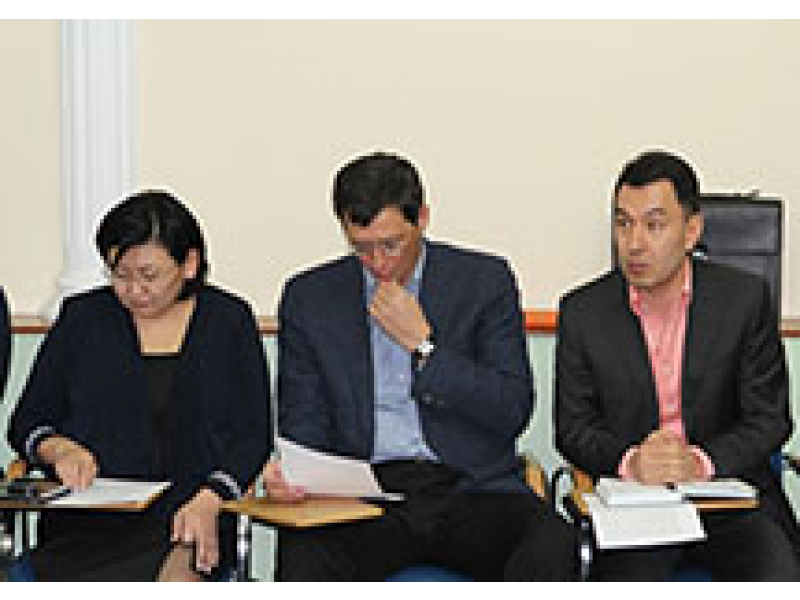Media
"Damu" Fund and banks are seeking a compromise regarding the unification of data provided by borrowers in the frame of state programmes

On Wednesday, "Damu" Fund for Entrepreneurial Development, together with the independent members of its board of directors Serikbay BISEKEEV and Oraz ZHANDOSOV, discussed the fund's idea of unifying the applications from potential borrowers to obtain credit through state-funded programmes, and acceleration of the banks' decision-making process regarding such loan applications. As might be expected, the initiative was not greeted with enthusiasm by the bank representatives present, since it is difficult to find a more conservative community than a bank, or an organization more prudent when it comes to their internal procedures.
The proposals put forth by Mr. Bisekeev enable applications to be made using a special electronic portal. The application must contain all the information that the banks could possibly request, in addition to all the data available from government agencies, including amounts of tax paid, as well as behavioural scoring from the First Credit Bureau. In the future, banks that have their own access to the portal could work with this potential borrower, requesting additional information and, in some cases, even competing for it. Mr. Bisekeev considers it of vital importance that it is the banks who are interested in the borrowers, and that the borrowers themselves are not subjected to complicated procedures compiling documents - sometimes for several banks at a time.
Among small businesses, stereotypes persist about a line of credit not being issued without personal acquaintance with someone at the bank, in addition to extreme bureaucratisation of the lending process. (As noted by one of the bankers, "borrowers are always unhappy - if they are issued a loan speedily, they will be displeased at this too.") Mr. Bisekeev reckons that a bank's decision on lending may be taken in a single day, as it is in Turkey, because intellectual potential cannot be said to be lower in Kazakhstan.
Of course, the proposal to grant a loan in one day turned out to be an issue of quite serious annoyance, much like a "red rag"; after discussion, the proposal is unlikely to remain pertinent, and the parties are now discussing a unified maximum processing time. The bankers' arguments were grounded on the fact that they need at least to verify the physical presence of collateral, which requires a week at the very least. Banks bear credit risks, and perhaps the decisions their foreign colleagues can make in a single day are secured on the basis of guarantees and sureties rather than on collateral. If "DAMU" gave guarantees to all borrowers, the loan decision-making process would be automatic. This provoked a counter-question: "Why, then, would you be necessary?" to which the response was, "Where else would you be able to find such a wide distribution network?"
Much more powerful arguments stem from the fact that "the ball is actually in the court of the borrower," while business remains very opaque. In many instances, banks are required to conduct financial analyses, since it is impossible in certain cases to draw any conclusions based on official financial statements prepared for the tax authorities, and the banks have to verify the claims of businessmen that their income levels are in fact higher. In some cases, the borrowers are not even separate businesses, but groups of companies. Many banks that issue loans to small businesses already have scoring models. Any changes to lending parameters as a result of unification would entail very complicated and time-consuming changes to the programme, or a return to the "lending by guess-work, pen in hand" scenario.
Stanislav Kosobokov, the Deputy Chairman of Halyk Bank, also remarked on the opacity of business and the absence of instruments that our banks have recourse to - citing the example of the Russian Federation, where there is unrestricted access to the registry of legal entities that has a sufficiently large database. No less important is the availability of statistics from the National Bank regarding the level of lending to micro, small and medium enterprises, on the basis of bank statements - in accordance with specific regulatory criteria relating to the borrower's particular category. On the basis of these statistics, there would be enhanced clarity, for example, with the market shares of banks, and they could adjust their strategies accordingly.
In general, the key factor to improving the situation for customers is competition between the banks, the level of which is quite high. Mr. Zhandosov agrees that major changes may occur with the influence of competition, but, in his opinion, we should not forget that the issue still hinges on public money that is allocated from the National Fund, either directly or under state guarantees through loans from international financial organizations. (Mr. Bisekeev asserts that, according to preliminary estimates, these loans can total up to $ 800 million). Infusions of funds are carried out to support the borrowers, not the banks, and delays in the decision-making process creates a negative attitude not only towards banks, but also towards government programmes in general. The Independent directors also believe that in the case of small businesses, we are talking about a lack of education and awareness, while medium-sized businesses may not need such support.
Lyazzat IBRAGIMOVA, Chairman of "Damu's" Board of Directors, noted that the fund intends to issue its warranties through a similar system, based on the provision of all available information from state agencies. In this case, the system has multiple barriers: the first of them to be weeded out will be the false entrepreneurs, then those who have had problems with payment discipline, and so on. With regard to significant differences between real income and that accounted for tax, Ms. Ibragimova suggests that perhaps the best approach would be simply issuing guarantees and loans based on the amounts of taxes paid. If the borrower increases their tax payments in the future, they may accordingly increase the amount of support. (However, the bankers looked more favourably on the possible adoption of a stringent regulatory act that only "white" businesses should be funded, as declared by Mr. Zhandosov.)
Obviously, a few years ago such a discussion would hardly have been possible. But nowadays, funding under state programmes and the quotas allocated to particular banks are strong enough arguments. The position of the banks has also been taken into account, and at the end of the discussion, both sides talked about the fact that such changes should only be applicable to micro businesses. Ms. Ibragimova believes that the next meeting of the working group will be held in two weeks' time, when the banks will be introduced to the already existing features of the e-gov portal, and will also have the opportunity to meet the leadership of the structure that is developing technical solutions for providing information from state agencies. "Damu" chose to finance these solutions with the help of budgetary spending, but in their interests, banks or Financier Associations may negotiate access to information on a commercial basis.
If as a result of these discussions we have managed to create a capable mechanism and not something along the lines of "revolutionary expediency", the winner will most likely turn out to be the banking sector itself. Perception will be improved as a result of transparent competition for good micro business borrowers. Moreover, it might be possible to expand a customer base that is becoming more mobile, and financed not only through government programmes.
Source:Панорама






